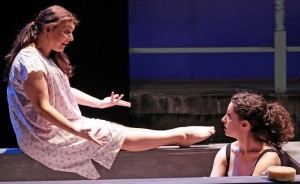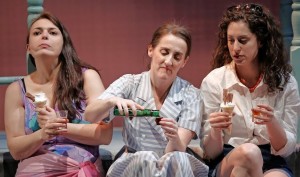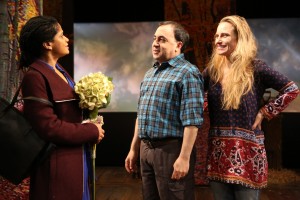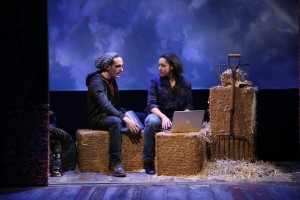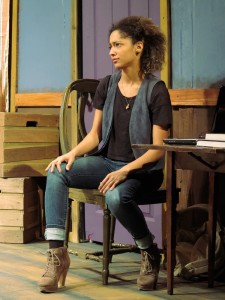This Space Between Us contains the opposite of an 11 o’clock number. The nonmusical scene late in the play is a showstopper all right, though not in the rousing good sense. Rather, all action and dialogue literally stop while two characters stand over an air mattress as it inflates. It lasts ... well, however long it takes an air mattress to inflate, which may only be about a minute but seems a lot longer, since the audience has to sit there and wait out this unnecessary moment in a show that has already worn out its welcome.
Wolf Play
There have been plays affirming LGBTQ people’s fitness as parents. There have been plays where child characters are played by puppets, and stories in which a child who feels different identifies as some type of animal. Boxing has been used as a metaphor, and there have been productions with lots of props and scenery that are upended by the final scene—one that comes to mind, Blasted, was staged at Soho Rep, whose new show, Wolf Play, includes all these things.
Sins of the Past
Scottish playwright Sharman Macdonald’s When I Was a Girl I Used To Scream and Shout, directed by John Keating, at the Clurman Theater, captures the tensions that often exist between parents and children. In this case, the play centers on a mother’s attempt to reconcile with her daughter. Morag (pronounced “MORE-ag”), played primly with repressed exuberance by Aedin Moloney, treats her daughter, Fiona, to a seaside holiday on the Scottish coast—to the town where they once lived.
Morag has a difficult time connecting with Fiona, who, at 32, is childless and unmarried. Morag is upset that Fiona hasn’t given her any grandchildren and tells her that “every woman needs to have a child” and, later, “a woman’s body is a clock that runs down rapidly.” Fiona, played by Barrie Kreinik with the needed detachment that comes from a childhood of disappointment, is also a vegetarian, a lifestyle choice that her mother understands as little as her marriage and childless state. In John Keating’s production, Luke Hegel Cantarella’s simple set allows rapid scene changes between the past divisions and the present encounter of the two women. The whole is enhanced by the lilting music of Paddy Moloney of the Chieftains.
Morag talks a blue streak and, as Fiona says, “cares passionately about everything: life and a ham sandwich.” Morag has packed not only tea in a thermos, but coffee and a picnic basket full of sandwiches and other goodies. Morag is clearly prepared for the activities that people undertake in life, but not really for life itself. She has believed so firmly in the traditional institution of marriage that it led her to make choices that deeply affected Fiona. Five years after Fiona’s father left, she finally met a new man whose work will take him to the Middle East. Morag makes arrangements for Fiona to live with the family of her best friend, Vari, played with spunk by Zoe Watkins. But Fiona wants her mother to stay. After all, she’s only 15.
Morag, however, chooses the new man over her daughter, and while she’s making plans to leave, Fiona is looking for ways to make her stay. She finds what she thinks is a surefire solution: getting pregnant. Having explored her sexuality with Vari, Fiona lures Ewan (Colby Howell), a winsome boy a few years older than her, and one whom Vari had let kiss and fondle her, to the beach and tells him she’s ready to have sex. He’s eager to lose his virginity so willingly gives in. Fiona gets pregnant as a result of that encounter, but the plan backfires, and her mother still goes off with her new husband. It’s a bitter pill to swallow, and Fiona’s sadness over her past abandonment engulfs her. We see why Fiona’s mother wants to reconcile with her daughter, but it’s very hard for people to change. Morag only knows one way: her way. Her ideas about life hang in delicate balance. If she didn’t believe in what she had done—choosing a husband (a man) over her daughter—life probably would have broken her.
In comparison to Fiona’s childhood friend Vari, who has let herself become fat as a result of an unsatisfying marriage and three children, Fiona is thin and independent. Vari calls Fiona a “privileged feminist.” However, in reality Fiona is haunted by the ghosts of the past. She carries her confusion and resentment silently into the present. At the end of the play, when her mother begs her to talk to her, Fiona sits stonily beside her, but the fight is gone. Perhaps the barriers of contention have finally been torn down on this seaside excursion. At least, the vision of the three women eating a soft ice cream and sharing a shot of whiskey indicates a ray of hope that the wounds of the past and the relationship between mother and daughter will eventually be repaired.
Fallen Angel Theatre Company's production of When I Was a Girl I Used to Scream and Shout is playing through May 8 at the Clurman Theatre on Theater Row (410 W. 42nd St. between Ninth Avenue and Dyer Street). Evening performances are at 8 p.m. Wednesday through Saturday; matinees are at 2 p.m. Saturday and 3 p.m. Sunday. Tickets are $46.25; for more information visit fallenangeltheatre.org or telecharge.com.
Secrets, Secrets Are No Fun
Stop for a second and think about the way in which one interacts with one’s family, the way one assimilates to one’s society, how one honors one’s ancestors, how one speaks one's truth, and most importantly, how one heals oneself. Familiar, written by Obie Award winner Danai Gurira, challenges its audiences to think of all these situations. However, it is also a play that one must watch in order to fully understand how it can be powerfully healing and a life-changing experience for the audience.
Directed by Rebecca Taichman, Familiar tells a story of a Zimbabwean family living in Minnesota. The eldest daughter, Tendi (Roslyn Ruff), is getting married in a matter of days, and her rehearsal dinner is in a matter of hours. As the family prepares for the rehearsal dinner, Tendi and her fiance Chris (Joby Earle) announce to the family that in addition to a traditional Christian wedding, they are including a Zimbabwean ritual. This unexpected turn causes secrets to be revealed, old wounds to reopen, and forces the family to speak the truths about the past.
Although not based on her life, Gurira draws upon her own experience to create a credible script. Similarities between her life and the script includes how her Zimbabwean family also moved to the U.S. and how she was raised in Iowa while the family in the play live in Minnesota. In addition, the script allows the actors to unapologetically speak Shona as she presumably also did in her household. Unlike other shows that often translates anything other than English, Familiar takes advantage of an opportunity to be authentic, as well as give any audience member who speak Shona a small taste of home.
The ensemble includes, the father Donald, played by Harold Surratt, who grounds each scene with subtle facial expressions and dialogue. Myra Lucretia Taylor as Anne, Tendi’s aunt, is a strong and demanding presence on stage that is the main person connecting the family back to Zimbabwe heritage and ancestors. Anne’s sister Margaret, played by Melanie Nicholls-King, is the glue that keeps the family under control, even when she might feel her own life is falling apart. A definite gem in the performance by being the character that continually handles her sisters Anne and Marvelous (Tamara Tunie), as well as continually attempting to keep everyone calm. Ito Aghayere as Tendi’s sister, Nyasha, whose relentless need to bring the family back to their traditions heals the family. Her energy and enthusiasm propels the play forward and brings it back to a nourishing place.
The ensemble's chemistry and impeccable timing is a tremendous success to the production. Ruff and Tunie exhibit the vulnerable bond between mother and daughter. To balance them out are the future family members, “white boy from Minnetonka,” Chris (Earle) and his brother Brad (Joe Tippett). Their natural comedic interactions add to the play and cause the audience to laugh and scream in enjoyment. Overall, it is the ensemble’s conversations and arguments that encourage open discussion about past family issues, current events and pushes the audience to question their own lives.
From any seat, the audience can see all aspects of the highly-detailed set designed by Clint Ramos. Marvelous’ and Donald’s house is two floors with hallways, real doors and family pictures lining the wall. It is a breathtaking set that anyone would want to live in, including the audience who sit in comfortably cushioned seats, as if sitting on individualized mini couches. To support this design, Obie Award winner and lighting designer Tyler Micoleau incorporates the lights into the structure of the set to allow it to seem natural. Even the window is lit so that it appears as if looking out on a snowy day in Minnesota.
Another noteworthy design element was the sound design by Tony Award winner Darron L. West. During intermission, the recordings of celebratory Mbira music by the Shona people of Zimbabwe filled the theater. With a very hectic and hilarious ending to Act One, the traditional music played during intermission is a great way to gently introduce the audience to Zimbabwean music, as well as connects with the Mbira that is presented by Nyasha during the performance.
Fifty Shades of Activism
In Robert Lyons’ Death of the Liberal Class, directed by Jerry Heymann at the New Ohio Theatre, Nick, played with a self-deprecating aplomb by Steven Rattazzi, is a balding, pot-bellied academic who has written a book called "Robo Corp" that has garnered him great success after years of being an adjunct professor and a freelance journalist. However, after a “nervous breakdown” in which he rejects the ideas he has written about in the book—that robots will take over the world and that they are “standing on the precipice of the darkest period in history”—he has retreated to a farmhouse in Canada owned by his wife’s family.
His teenage daughter Andrea, played with a convincing mixture of indifference and righteousness by Jeanette Dilone, however, has dropped out of high school and followed him there. She has swallowed her father’s previous convictions hook, line and sinker, and has decided to pursue her own brand of activism, “hacktivism.” She is joined by the unassuming yet handsome Even, played by Justin Colon (who appears to have a magnificent singing voice revealed in one small snippet in the play) whom she has met online. The computer is the perfect tool for activism. Where it was once dangerous and possible to suffer bodily harm—think Kent State University in 1970 when four were killed and nine wounded in a melee between protesters and National Guard—computers have removed the physical component of activism and provided the safety of anonymity. Even and Andrea quietly, heads together, plan to take down the Robot Economy that her father has written about. The sexual tension is palpable even with their eyes glued to their respective keyboards.
Meanwhile, everyone is mad at Nick. He’s been sleeping with Maggie, the dewy skinned and wholesomely pretty Olivia Horton, who lives on the farm next door with her husband, and also with Daphne, his wife, when she comes to visit. Maggie’s husband beats her for sleeping with Nick and Daphne chides him for leaving New York City.
Although there is still sexual chemistry between them, Melissa Murray as Daphne captures the understated disdain that New Yorkers have for those who leave. After all, who, in their right mind, would leave an Upper West Side apartment in New York City? She may as well come out and say it: he’s a loser! But, somehow, living on the farm, in the middle of Canada has made Nick feel peaceful, and dare we say it, happy. In the opening scene, Nick’s daughter notes how happy he seems. When he retorts “I’m not allowed to be happy?,” she nearly chokes with disgust, “Not this happy!”
Nobody wants Nick to change, especially his daughter. Yet, he no longer believes in the chaotic world he wrote about in his book nor does he want to have anything to do with it. His daughter decides to carry out her own grassroots activism, and hacks into Maggie’s account. Comic relief comes unexpectedly in an exchange between Nick, his daughter, and Constable La Fontaine, a Canadian Mountie who works in the cyber division, played with wonderful restraint by the mustachioed Arthur Aulisi. When the Constable arrives at the farmhouse to investigate the hacking, they deny it. Although the Constable remains beautifully polite, it appears he knows better. It’s a moment filled with tension and irony.
Although we usually think of men as being better hackers, Andrea is actually the gifted hacker who plans to infect Wall Street computers with a virus that will bring them crashing down. Nick pleads with her, and asks her to see how it will affect the little people, but she is so full of her own—or rather Nick’s—ideological idealism that she runs off with Even to carry out the plan.
When Nick’s wife realizes he isn’t coming back to the city with her, she leaves and gives him an eviction notice from the farmhouse. In the beginning of the play, you wonder what Nick’s appeal is: he’s a middle-aged guy with thinning hair and a thickening middle who’s sleeping with two beautiful women. But then we see that it’s his underlying sensuality that makes him attractive. After he rejects his own lofty “liberal” ideas about the Robot Economy, he actually becomes more attuned to the world of living through the senses. At one point, his daughter comes to him, computer attached to her arm like an extra appendage, complaining she can’t get access. He gently says “access these trees… access the sky.”
Robert Lyons’ play asserts a very important message in this age of technology: that it can be both useful and destructive, but what it’s not, is sensual. Nick may be the underdog here, but in the end, he’s the one who is the true activist: being in tune with the senses is more likely to save humanity than anything else. The rest of the world around him needs a little more time to get there.
Death of the Liberal Class, written by Robert Lyons and directed by Jerry Heymann, runs through Feb. 13 at the New Ohio Theater (154 Christopher St., #1E between Greenwich and Washington Sts.) in Manhattan. Performances are Wednesday–Thursday at 7 p.m., Friday–Saturday at 8 p.m. and Sunday at 5 p.m. Tickets are $18 and can be purchased by calling 1-888-596-1027 or visiting http://www.NewOhioTheatre.org.
Dilapidated Dreams
What happens when an aging softcore porn director returns to his family home in Levittown, L.I., to sort through the remnants of his childhood while harboring hopes of repairing broken family ties? Allen Wilder 2.0, currently running at Theater for the New City, urgently wants to come to terms with what it means to age while living a life, less than exemplary, full of unfulfilled dreams.
The fast-paced dialogue is handled aptly by three, age-appropriate actors: Joe Casey (Michael Sullivan), Steph van Vlack (Donna Mullins) and Becca Fox (Kayla). A special nod to van Vlack and Casey who, while probably afraid to show it, did very well baring more than their artistic souls.
There is the age-old argument in theater—should the playwright also be the director? Often, having the writer and the director be one in the same provides no distance from the work that is afforded a different director. While the overall direction of Allen Wilder 2.0 by Matt Morillo is exceptional, the challenge is in his script, which brings little that is new to the conversation of self-worth, family dynamics, aging, abandonment, parental divorce, sex, fear of intimacy, and the longing for approval.
The actors, however, bring life to what they were given. Casey embraced the ‘40-something animated male from Los Angeles with charm and certitude. His voice is clear and full of expression and was often burdened with the running gag, “It’s soft core!” when others referred to his directorial work in porn, attempting to somehow make it palpable. Casey’s personal challenge is evidenced with his thigh slaps as the end to arm or shoulder gestures. At second glance, his nude scene is apropos to the events and is played off well with the use of a plastic fireman’s helmet.
Michael’s love interest, albeit for one night, is his former babysitter, Donna, who has 10 years and two children on him. As Donna, van Vlack embodied all the fear of a middle-aged, small-town woman “challenged by gravity.” The character may have been full of fear, however, van Vlack embraced her curvaceous body when Michael was finally able to dispense with her dress. The "come here, go away" choreography between Donna and Michael wore a little thin after time, and the script didn’t provide much room for her character to grow; it left the audience wanting more.
Kayla, Michael’s niece, is argumentatively played by Becca Fox, who is fresh and crisp, with a confident edge to her voice. Kayla’s disdain for her uncle is exacerbated when she inadvertently walks in on the remnants of Michael and Donna’s tryst. Michael fumbled through his attempt to reconcile with her until she revealed that she read his journal that brought to light her grandfather’s overt racism. Given Kayla’s father is black, her mother’s attempt to honor the memory of the man, creates a wedge between Kayla and her mother that appears insurmountable.
The audience arrives to a blaring and lively '80s rock soundtrack. Once the play commenced, the dialogue is fast-paced with a few contemporary references and some humor woven into the script. When offered to drink from a bottle of 25 year-old whiskey, Donna asked, “No glasses, are we animals?” to which Michael slyly replied, “We’ll see.” Unfortunately, the overall script never appeared to find its footing or depth.
Designed by Mark Marcante, the set is the abandoned family home in Levittown. There are a few subtle references to the famous mid-century track homes; a piece of abstract art and two Arthur Umanoff-style wood slat swivel counter stools. Packing boxes are stacked in the corner for Michael to go through the things he left behind, and there is an oddly placed desk, devoid of a lamp or phone, off to the side near the backdoor. The house felt more like an abandoned farmhouse rather than a residual to the testament of the “American dream” for a middle-class family.
The unfortunate thing about the lighting, designed by Amith Chandrashaker, is that no reference is made to night or day; the lights are on. After returning from a night of drinking, Michael and Donna burst on scene, well into the evening, with the porch light lit, while Kayla finds them asleep in the morning all to the same lighting in the second scene. The play takes place over a 12-hour period leaving the imagination to conjure evening, morning and mid-day lighting.
The credit for an enjoyable evening goes to the actors and their willingness to step outside themselves, embodying the characters on the printed page of Allen Wilder 2.0. The kindness portrayed by Michael’s character near the end of the play may not have much lead-in, but offers a glimpse into the generosity of human spirit with the ability to start anew merely by saying so.
Allen Wilder 2.0 runs until Jan. 31 at Theater for the New City (155 First Ave. at East 10th St.). Performances are Thursday-Saturday at 8 p.m. and Sunday at 3 p.m. Tickets are $18 and can be purchased by calling SmartTix at 212-868-4444 or visiting www.smarttix.com. For more information, visit http://www.theaterforthenewcity.net/allenwilder2.html.
Chasing the American Dream
The Golden Bride ("Di Goldene Kale"), a joyful operetta from 1923 performed on the compact stage at the Museum of Jewish Heritage by the National Yiddish Theatre Folksbiene, is set in a small Russian village and begins with a tongue-in-cheek song about money. In Yiddish with English and Russian supertitles, the cast sings “Oi, Oi, The Dollar” when Goldele, a young woman who has been raised by another family learns that her father, who moved to America when she was a child, has died and left her a fortune. Thus begins a tale that folds real-world politics (the metamorphosing face of Russia, immigration and the pursuit of money in America) into a fairytale of love and marriage.









